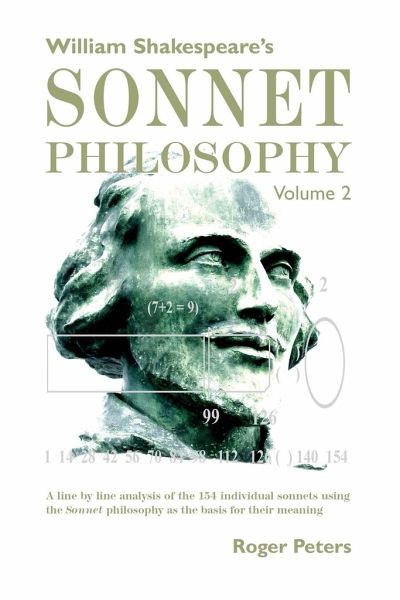
William Shakespeare's Sonnet Philosophy Volume 2
A line by line analysis of the 154 individual sonnets using the Sonnet philosophy as the basis for their meaning

PAYBACK Punkte
12 °P sammeln!
This 2018 second edition of Volume 2 from the four-volume slip-case set William Shakespeare’s Sonnet Philosophy (2005) is the first of the four volumes to be made available on digital platforms worldwide. The other three volumes will follow over the next couple of years. Volume 1 shows how Shakespeare structured his nature-based philosophy into the 1609 Sonnets. Volume 2 examines each of the 154 sonnets line by line to show that the Sonnet philosophy is the basis for their meaning. Volume 3 analyses a selection of poems and plays to show that they can be understood only from the vantage of t...
This 2018 second edition of Volume 2 from the four-volume slip-case set William Shakespeare’s Sonnet Philosophy (2005) is the first of the four volumes to be made available on digital platforms worldwide. The other three volumes will follow over the next couple of years. Volume 1 shows how Shakespeare structured his nature-based philosophy into the 1609 Sonnets. Volume 2 examines each of the 154 sonnets line by line to show that the Sonnet philosophy is the basis for their meaning. Volume 3 analyses a selection of poems and plays to show that they can be understood only from the vantage of the Sonnet philosophy. Volume 4 features an essay on the shared logic of Marcel Duchamp and Shakespeare plus ten other essays. Volume 2 takes the nature-based philosophy of the whole set of 154 sonnets in Shake-speares Sonnets of 1609 with its deeply structured sequences to show that every line and word of each sonnet conforms to its inherent logic. Hence, Volume 2 confirms that the philosophy Shakespeare develops early in his career as a playwright and poet is evident in every aspect of the 154 sonnets. The line-by-line analysis of the 154 sonnets using their inherent philosophy provides the first ever appreciation of reason Shakespeare wrote sonnets in the 1590s or modified earlier ones in the 1600s to express the various elements of natural logic by 1609. The increase sonnets, the increase to poetry sonnets, the truth and beauty sonnets to the Master Mistress and the beauty and truth sonnets to the Mistress unfailingly apply the female/male dynamic in nature to make visible the logic of the human mind and consequently the logic of writing. When the individual sonnets are viewed from their inherent philosophy, traditional prejudices toward the set are exposed and the sixty or so emendations made to the 1609 edition by commentators since Malone in the 1790s from the inverted logic of the Christian/Platonic paradigm are shown to be unnecessary.












